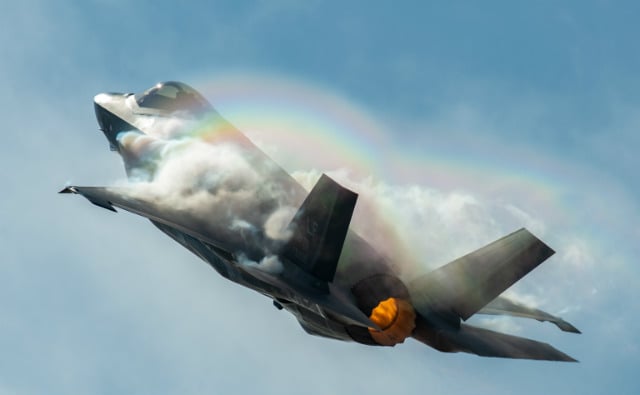
US Air Force F-35A
WASHINGTON: Switzerland this morning picked Lockheed Martin’s F-35A over the Boeing F/A-18E/F Super Hornet, Dassault Rafale and Eurofighter Typhoon for its $6.5 billion fighter program. The win is quite a bright spot for the F-35 — which is under funding pressure from the US Air Force and Congress because of what are estimated to be its sky-high sustainment costs.
“It’s a very solid win. Switzerland has no industrial or program stake in the program, and Swiss procurement, like the country, is largely neutral, so this reflects very well on the F 35’s overall technical appeal,” said aviation analyst Richard Aboulafia of Teal Group in an email.
The decision to buy 36 F-35s today was made by the Swiss Federal Council (along with a decision to buy five Patriot missile defense batteries from Raytheon) and now goes to Parliament for approval.
Deliveries will begin in 2025, to replace Switzerland’s current 30 Boeing F/A-18C/D aircraft that will retire in 2030.
The F-35 beat out its competitors — Boeing’s F/A-18; French firm Dassault’s Rafale; and German-base Airbus’s Eurofighter — on both upfront procurement costs, and somewhat surprisingly, operating costs, the Federal Council explained in a statement.
The F-35 bid was some 2 billion Swiss francs (CHF, equalling some $2.16 billion) lower than the other bids, the statement explained. The procurement costs in Lockheed Martin’s bid also fell below the Swiss government’s top line budget for the fighter buy of CHF 6 billion ($6.5 billion) at CHF 5.068 ($5.48 billon).
In what surely must be a hard thing for Lockheed’s competitors to read, the Swiss Federal Council says: “The F-35A also has the lowest operating costs of all of the candidates evaluated. The total costs of the F-35A (i.e. procurement plus operating costs) amounts to approximately CHF 15.5 billion [$16.77 billion] over 30 years.” (Compare this with the estimated $1.2 trillion in life-cycle costs for the US fleet of 2,456 F-35 Joint Strike Fighter aircraft; 1,763 of them for F-35As for the Air Force.)
“[T]he grounds for the decision are interesting,” Byron Callan, defense industry analyst at Capitol Alpha, said in an assessment of the Swiss move today. “We don’t know if some of the F-35’s stealth characteristics were de-tuned, which also would support lower sustainment costs.” Callan also noted that the “F-35 is a single engine aircraft and the ones it competed against are twin-engine jets.”
“With 336 points, it showed the highest overall benefit and was the clear winner with a lead of 95 points or more over the other candidates. This aircraft scored best in three of the four main criteria evaluated,” the Swiss statement added. Those categories were effectiveness; product support; cooperation; and the amount of “offset” work provided to Swiss industries.
Interestingly, the Federal Council also counted the F-35A’s “especially high level of cyber security” as a key point in its favor. Switzerland made all of the competitors promise “data autonomy” in operating the fighter jets, to limit Bern’s “dependencies” on the company and manufacturing country. “Switzerland controls which information to exchange with other air forces via data link, and what logistics information to report back to the manufacturer. In addition, the aircraft will be operated and maintained in Switzerland by the Swiss Air Force and RUAG Switzerland,” the Federal Council said.
“With the selection, Switzerland will become the 15th nation to join the F-35 program of record, joining several European nations in further strengthening global airpower and security. To date, the F-35 operates from 21 bases worldwide with more than 655 F-35s in service today,” Bridget Lauderdale, new Lockheed Martin vice president and general manager of the F-35 Program, said in a statement provided to Breaking D.
Callan opined that the Swiss win could give Lockheed Martin a leg up in the upcoming Finnish contest for 64 fighter jets to replace its F/A-18s, where its main competitor is assessed to be Saab’s Gripen. The Finnish contest is one of the two biggest international fighter competitions in the works. The other is Canada’s planned buy of 88 aircraft to replace its aging CF-18s. Capital Alpha has long put the F-35 as the top contender in that battle, with the other players being the Gripen and Boeing’s Super Hornet.
In a ‘world first,’ DARPA project demonstrates AI dogfighting in real jet
“The potential for machine learning in aviation, whether military or civil, is enormous,” said Air Force Col. James Valpiani. “And these fundamental questions of how do we do it, how do we do it safely, how do we train them, are the questions that we are trying to get after.”


























